Purchasing a plane ticket seems about the only thing that has anything to do with air travel. You open the website, introduce your card, purchase the ticket, and if you are lucky you can either spend some of your points on air miles or get some air miles with your purchase. But now a new US Bill could change the way that major airlines like American Airlines, United, and Southwest deal with this purchases and reward systems associated with co-branded credit cards with Visa and Mastercard.
The rewards system linked to credit cards has been operational for a very long time, as the whole American banking system works on credit and rewards, many companies started to offer individuals points and rewards to ensure that customers chose to have their debt and thus their interest payments linked to their cards and accounts, and so the perks got better and more specific, with airline miles, hotel discounts and car rentals associated with many transactions.
And now, airlines rely heavily on these co-branded credit cards as a major stream of income. In 2023, these cards were responsible for generating over half of all frequent flyer miles and points, which in turn helped fund close to 16 million domestic flights.
How this new legislation on Visa and Mastercard would affect both airlines and flight purchases
The new Bill that has been proposed would not straight up end the benefits, but it would severely curtail them as well as reduce the transaction fees these payment networks impose, which would help consumers with avoiding some of the undue payments. Sponsored in Congress by Senators Dick Durbin (Democrat) and Roger Marshall (Republican), it could be quite popular with the public if the unintended consequences do not affect their ability to acquire air miles.
Bur airlines are not as on board with the situation. A letter was sent to the Senate opposing the legislation and it was signed by American Airlines (AAL.O), United Airlines (UAL.O), and Southwest Airlines (LUV.N), along with industry giants such as Boeing, Airbus, RTX, and GE Aerospace. According to them, this legislation would not be good for the sector and the American public and they have warned the authorities that impact would be devastating for both frequent travelers and tourism in general should this piece of legislation pass, especially as is.
Their warning is extensive, but one of the standout points that they made that they say would be especially devastating for the industry is the disappearance of loyalty programs. If the legislation goes into effect, millions of American that have chosen through the years to exclusively use a card and an airline because of the interconnected perks would lose all the loyalty points and would be back at square one without the ability to redeem those points for free travel and upgrades. It would also disincentivize airlines to do better, as there would be a lot less competition to build customer loyalty though the expected perks.
Despite the protests, other countries do not have these kinds of rewards programs and have a thriving airline industry, as the perks are obtained by simply flying and not by incurring in more debt, which is what lawmakers seem to be concerned about. In fact, so much so that this is not the first time that they have tried to pass this piece of legislation.
The previous attempt took place in 2023, but it was blocked due to pressure from airlines and other financial sector players. This time around legislators are trying to get around the block by linking it to another bill, such as the one currently being debated on cryptocurrencies, and framing it as an economic bill instead of as an attack on airlines and their methods.

